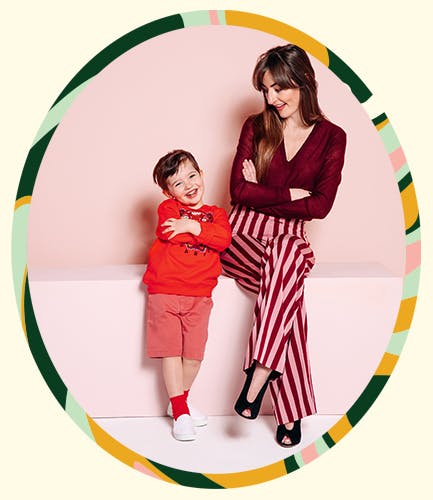Nowadays, creating relationships is seemingly easier than ever. There’s an app for every kind of rapport, helping you make connections specific to who you are. But if you’re a new mum, it’s not as easy as swiping right, and loneliness—which is quickly becoming one of Britain's biggest public health issues—can be common in early motherhood.
As if 2 AM feedings, nappy changes, and just generally being responsible for a new life isn’t overwhelming enough, at times being a new mum can feel isolating. It can feel like your life has been suddenly hijacked by all things baby, leaving no time for socialising or self-care. Michelle Kennedy, founder of Peanut, knows this all too well. Dubbed “Tinder for mums,” the app brings like-minded mothers together, offering a support network and providing a more personal community where you can vent and receive advice from mums you trust.

The idea for the Peanut came after Kennedy struggled to make valuable connections with mothers she could relate to after her son Finlay was born, and the onset loneliness that came with that. “Loneliness wasn’t even something I’d considered, at any point,” Kennedy says. “To be honest, it’s not madly comfortable to admit to feeling lonely aged 30. It’s almost a feeling you can’t immediately pinpoint. Interestingly, since motherhood, it’s something I understand more acutely than ever before, almost something I am tuned in to, to spot it in others too.” She wanted to make the experience motherhood less daunting, helping women maintain their identity by allowing them to build the type of community they want, tailored to their personalities, interests and needs.
Going from demanding job in tech, to spending every day alone with her newborn was an adjustment she hadn’t accounted for, and a difficult one at that. “When Finlay arrived, I felt as if I had been naive,” she says. “I hadn’t appreciated how different everything would become. He was incredible, beautiful, fragile, I couldn’t believe I’d had any part in something so perfect—all 9 pounds of him—but I was scared, I felt like everything was changing and it was out of my control.”
“I’d gone from working a million miles an hour, around people constantly and all of a sudden I was at home all day on my own with this little dude. My husband would go to work every day and ‘leave’ me at home, sounds ridiculous to phrase it like that, but that’s how it felt at the time.”
“
Loneliness wasn’t even something I’d considered, at any point.
For Michelle, a big part of that loneliness was down to the unexpected identity crisis that comes with becoming a mother, and not having anyone who would really understand what that was like. “The strongest feeling was that I’d really lost my identity, I wasn’t really sure who Michelle the Mother was. Admitting how I felt about the start of motherhood was not something I felt able to share at the time. I didn’t feel that it was socially acceptable to say “it’s really tough, and it’s not exactly what I thought it would be”. I would share snippets with my friends, or my husband, but I didn’t really know how to articulate the feeling that I was lonely, and felt like I was faking it as a competent, together mother. Wherever I looked, I didn’t see anyone who seemed to be feeling the same way as me.”
The importance of community when raising a child is often overlooked. While it’s no secret that motherhood is challenging, overwhelming and at times downright scary, all of that becomes a little bit more manageable when you have a support network who really get you, and know what you’re going through. But it’s easier said than done, and Kennedy knows from experience how hard it is to truly connect with other mothers. “You try lots of different things,” she says. “You try to be an extrovert even if you don’t feel like one, in order to find someone to spend time with! Making mum friends was terrifying, and difficult.”
Making friends as an adult is difficult enough, but it’s even harder when you’re dealing with the difficulties of motherhood. It’s made even more challenging when you’re pressured by the cultural assumption that women will get along just because they have kids, something that in itself says a lot about how we think of motherhood. The notion that women lose their identity as soon as they procreate, and take on the role of “Mum”, does a huge disservice to women, and makes socialising that much more complicated.
“There are so many different types of women, who all have different interests, values, points of view. Of course, not all mums are the same,” explains Michelle. “That artificial coming together because “you're a mum, I’m a mum, we need to hang out” can be awkward and forced, and make you feel lonely all over again,” she says, recounting how she tried NCT groups but was left feeling like she didn’t fit in with other mums.

She couldn’t relate to the portrayal of motherhood she was introduced to, and found there were no tools to communicate with mothers on her same wavelength. So she decided to take matters in her own hand, creating Peanut as a modern way for new-gen mums to connect, offering a solution to outdated Facebook groups and Mumsnet forums (challenging the stereotype that mums don’t know how to use technology).
In the two years since Peanut first launched, it has amassed over 650,000 users, whom Kennedy says are looking for nothing more than “a community, a sense of belonging, a sense of feeling normal, and wanting to find other women at a similar life stage.”
The app is redefining our understanding of motherhood, but Kennedy says there’s still a way to go. “Things are getting better, we’re already speaking about it in a different way to when we launched Peanut...but until women can really speak openly about the issues affecting them, pregnancy at work, maternity leave, the motherhood tax, we must keep the conversation going!”






